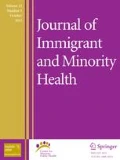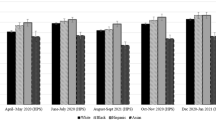Abstract
The study examined immigration factors associated with depressive symptom severity among Asian American immigrants. Participants were 458 Chinese, Korean and Vietnamese adults. Depressive symptom severity was measured by PHQ-9. Overall, the likelihood of being moderately to severely depressed was significantly increased among immigrants living in the US for < 10 years and Korean Americans compared to Chinese Americans. However, mild level of depressive symptoms was not associated with any immigration-related factors. The positive impact of shorter duration of living in the US and a younger age at immigration (≤ 17) on depressive symptoms was evident among women but not among men. For men, marital status and education level were significant predictors of being moderately to severely depressed. Differentiating immigrant factors and identifying depressive symptom severity can help drive community and clinical interventions to detect and treat depression early among Asian American immigrants.

Similar content being viewed by others
References
World Health Organization. Depression and other common mental disorders: global health estimates. Geneva: World Health Organization; 2017.
Hasin DS, Sarvet AL, Meyers JL, Saha TD, Ruan WJ, Stohl M, et al. Epidemiology of adult DSM-5 major depressive disorder and its specifiers in the United States. JAMA Psychiatry. 2018;75:336–46.
Takeuchi DT, Zane N, Hong S, Chae DH, Gong F, Gee GC, et al. Immigration-related factors and mental disorders among Asian Americans. Am J Public Health. 2007;97:84–90.
Breslau J, Chang DF. Psychiatric disorders among foreign-born and US-born Asian-Americans in a US national survey. Soc Psychiatry Psychiatr Epidemiol. 2006;41:943–50.
Singh S, Schulz AJ, Neighbors HW, Griffith DM. Interactive effect of immigration-related factors with legal and discrimination acculturative stress in predicting depression among Asian American Immigrants. Community Ment Health J. 2017;53:638–46.
John DA, de Castro AB, Martin DP, Duran B, Takeuchi DT. Does an immigrant health paradox exist among Asian Americans? Associations of nativity and occupational class with self-rated health and mental disorders. Soc Sci Med. 2012;75:2085–98.
Hong S, Walton E, Tamaki E, Sabin JA. Lifetime prevalence of mental disorders among Asian Americans: nativity, gender, and sociodemographic correlates. Asian Am J Psychol. 2014;5:353–63.
Vespa J, Armstrong DM, Medina L. Demographic turning points for the United States: population projections for 2020 to 2060. Washington, DC: U.S. Census Bureau; 2018. p. 25–1144.
Jensen E, Borsella C, Nestor K. The place-of-birth composition of immigrants to the United States: 2000 to 2013. San Diego, CA; 2015
López G, Ruiz NG, Patten E. Key facts about Asian Americans, a diverse and growing population [Internet]. Pew Research Center; 2017. https://www.pewresearch.org/fact-tank/2017/09/08/key-facts-about-asian-americans/. Accessed 29 Sept 2017.
Kalibatseva Z, Leong FTL. Depression among Asian Americans: review and recommendations. Depress Res Treat. 2017. https://www.ncbi.nlm.nih.gov/pmc/articles/PMC3180820/. Accessed 20 Dec 2017.
Ihara ES, Chae DH, Cummings JR, Lee S. Correlates of mental health service use and type among Asian Americans. Adm Policy Ment Health. 2014;41:543–51.
Nguyen D, Bornheimer LA. Mental health service use types among Asian Americans with a psychiatric disorder: considerations of culture and need. J Behav Health Serv Res. 2014;41:520–8.
U.S. Census Bureau. 2013–2017 American community survey 5-year estimates. 2019. https://factfinder.census.gov/faces/tableservices/jsf/pages/productview.xhtml?src=CF
Kroenke K, Spitzer RL, Williams JB. The PHQ-9: validity of a brief depression severity measure. J Gen Intern Med. 2001;16:606–13.
Nguyen TQ, Bandeen-Roche K, Bass JK, German D, Nguyen NTT, Knowlton AR. A tool for sexual minority mental health research: The Patient Health Questionnaire (PHQ-9) as a depressive symptom severity measure for sexual minority women in Viet Nam. J Gay Lesbian Ment Health. 2016;20:173–91.
Yeung A, Fung F, Yu S-C, Vorono S, Ly M, Wu S, et al. Validation of the Patient Health Questionnaire-9 for depression screening among Chinese Americans. Compr Psychiatry. 2008;49:211–7.
Han C, Jo SA, Kwak J-H, Pae C-U, Steffens D, Jo I, et al. Validation of the Patient Health Questionnaire-9 Korean version in the elderly population: the Ansan Geriatric study. Compr Psychiatry. 2008;49:218–23.
Leung P, Cheung M, Kao D, Gulati AC. Prevalence and predictors of depression in the older Asian Americans in Houston. Int Soc Work. 2017;60:800–14.
Mui AC, Kang S-Y. Acculturation stress and depression among Asian immigrant elders. Soc Work. 2006;51:243–55.
Lau AS, Tsai W, Shih J, Liu LL, Hwang W-C, Takeuchi DT. The immigrant paradox among Asian American women: are disparities in the burden of depression and anxiety paradoxical or explicable? J Consult Clin Psychol. 2013;81:901–11.
Shekunov J. Immigration and risk of psychiatric disorders: a review of existing literature. Am J Psychiatry Resid J. 2016;11:3–5.
Takeuchi DT, Alegría M, Jackson JS, Williams DR. Immigration and mental health: diverse findings in Asian, Black, and Latino populations. Am J Public Health. 2007;97:11–2.
Lee SM, Edmonston B. Age-at-arrival’s effects on Asian immigrants’ socioeconomic outcomes in Canada and the U.S. Int Migr Rev. 2011;45:527–61.
Zhu L. Depression risks and correlates among different generations of Chinese Americans: the effects of relationships with friends and relatives. Soc Sci. 2017;6:56.
Alegria M, Sribney W, Woo M, Torres M, Guarnaccia P. Looking beyond nativity: the relation of age of immigration, length of residence, and birth cohorts to the risk of onset of psychiatric disorders for latinos. Res Hum Dev. 2007;4:19–47.
Lee RM, Liu H-TT. Coping with intergenerational family conflict comparison of Asian American, Hispanic, and European American college students. J Counsel Psychol. 2001;48:410–9.
Perez R. Effects of immigration during adolescence on mental health and social well-being. Issues Mental Health Nurs. 2016;37:765–8.
Mair C, Diez Roux AV, Osypuk TL, Rapp SR, Seeman T, Watson KE. Is neighborhood racial/ethnic composition associated with depressive symptoms? The multi-ethnic study of atherosclerosis. Soc Sci Med. 2010;71:541–50.
Kramer EJ, Kwong K, Lee E, Chung H. Cultural factors influencing the mental health of Asian Americans. West J Med. 2002;176:227–31.
Leu J, Yen IH, Gansky SA, Walton E, Adler NE, Takeuchi DT. The association between subjective social status and mental health among Asian immigrants: investigating the influence of age at immigration. Soc Sci Med. 2008;66:1152–64.
Zhang J, Fang L, Wu Y-WB, Wieczorek WF. Depression, anxiety, and suicidal ideation among Chinese Americans. J Nerv Ment Dis. 2013;201:17–22.
Sangalang CC, Gee GC. Depression and anxiety among Asian Americans: the effects of social support and strain. Soc Work. 2012;57:49.
Kim HJ, Park E, Storr CL, Tran K, Juon H-S. Depression among Asian-American adults in the community: systematic review and meta-analysis. PLoS ONE. 2015. https://www.ncbi.nlm.nih.gov/pmc/articles/PMC4452590/. Accessed 20 Dec 2018
Cho MJ, Seong SJ, Park JE, Chung I-W, Lee YM, Bae A, et al. Prevalence and correlates of DSM-IV mental disorders in South Korean adults: the korean epidemiologic catchment area study 2011. Psychiatry Investig. 2015;12:164–70.
Gu L, Xie J, Long J, Chen Q, Chen Q, Pan R, et al. Epidemiology of major depressive disorder in mainland china: a systematic review. PLoS ONE. 2013;8:e65356.
OECD. Suicide rates. [Internet]. https://data.oecd.org/healthstat/suicide-rates.htm.
Shin C, Kim Y, Park S, Yoon S, Ko YH, Kim YK, et al. Prevalence and associated factors of depression in general population of Korea: results from the Korea National Health and Nutrition Examination Survey, 2014. Journal of Korean medical science. 2017.
Lee M, Nezu AM, Nezu CM. Acculturative stress, social problem solving, and depressive symptoms among Korean American Immigrants. Transcult Psychiatry. 2018;55:710–29.
Lui PP, Rollock D. Acculturation and psychosocial adjustment among Southeast Asian and Chinese immigrants: the effects of domain-specific goals. Asian Am J Psychol. 2012;3:79–90.
Vega WA, Rumbaut RG. Ethnic minorities and mental health [Internet]. Rochester, NY: Social Science Research Network; 1991. Report No.: ID 1881264. https://papers.ssrn.com/abstract=1881264
Kirmayer LJ, Narasiah L, Munoz M, Rashid M, Ryder AG, Guzder J, et al. Common mental health problems in immigrants and refugees: general approach in primary care. CMAJ. 2011;183:E959–E967967.
Althubaiti A. Information bias in health research: definition, pitfalls, and adjustment methods. J Multidiscip Healthcare. 2016;9:211–7.
Cho H, Kim I, Velez-Ortiz D. Factors associated with mental health service use among Latino and Asian Americans. Community Mental Health J. 2014;50:960–7.
Lee M, Takeuchi D, Gellis Z, Kendall P, Zhu L, Zhao S, et al. The impact of perceived need and relational factors on mental health service use among generations of Asian Americans. J Community Health. 2017;42:688–700.
Funding
The project was supported by TUFCCC/HC Regional Comprehensive Cancer Health Disparity Partnership, Award Number U54 CA221704(5) from the National Cancer Institute [Contact PIs: Grace X. Ma, PhD and Olorunseun O. Ogunwobi, PhD] and faculty research funds from Center for Asian Health, Lewis Katz School of Medicine, Temple University [PI: Grace X Ma, PhD]. The content is solely the responsibility of the authors and does not necessarily represent the official views of the National Cancer Institute or the National Institutes of Health.
Author information
Authors and Affiliations
Corresponding author
Ethics declarations
Conflict of interest
The authors declare that they have no conflict of interest.
Additional information
Publisher's Note
Springer Nature remains neutral with regard to jurisdictional claims in published maps and institutional affiliations.
Rights and permissions
About this article
Cite this article
Lee, M., Bhimla, A. & Ma, G.X. Depressive Symptom Severity and Immigration-Related Characteristics in Asian American Immigrants. J Immigrant Minority Health 22, 935–945 (2020). https://doi.org/10.1007/s10903-020-01004-7
Published:
Issue Date:
DOI: https://doi.org/10.1007/s10903-020-01004-7




